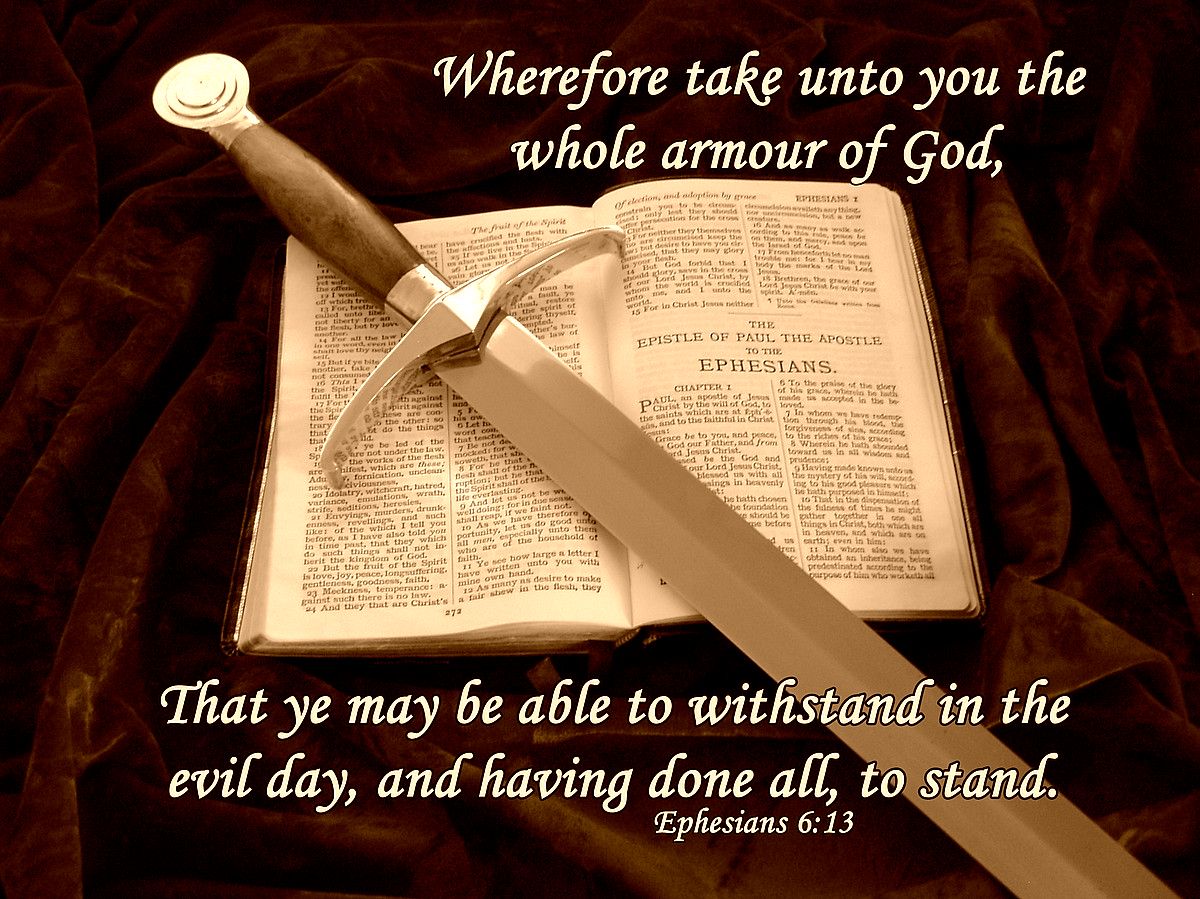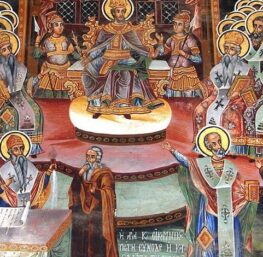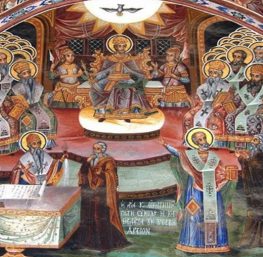 by Anthony Esolen –
by Anthony Esolen –
Truth is truth to the end of time. Even if the battle appears lost, let each Christian raise one sword at least against the lie. Even if the fight is fierce, the warfare long, let each Christian remember that our Captain triumphed in and through the hour of His utter defeat upon Calvary.
One day, said St. Jerome, the world awoke and groaned to find itself half Arian. It was the reasonable position of the time, bearing all the marks of historical inevitability. It shrugged away the most challenging points of Christology, for if Christ was but a creature, a Platonic demiurge, we need not puzzle our minds over how God might be both one and three. We need not be stunned into reverence by the words, “The Word was made flesh, and dwelt among us,” since the Word was, in a sense, already “flesh.”
Arianism was an easy slide. Most of the bishops leaned that way; it was the way of the well-stuffed. But Athanasius rose up contra mundum, the single-minded saint whom his opponents derided and often exiled for his bigotry. Athanasius was on the wrong side of “history.” Good for him; Christians must always so station themselves. Our Lord was murdered on Calvary by the great dead historical hulk called the Roman Empire.
To give up the Trinity is to give up Christ, and to give up Christ is to give up all.
Praise God for the Mule
Chesterton noted with his usual acuity that people who sneer at the Arian controversy—battles over a diphthong, said Gibbon—do not know what was at stake. If we believe that “God is love,” not that God happens to favor us, but that in his inner life God is himself love, we owe that belief to the inflexible fidelity of Athanasius. The Christian faith could and did baptize much of the ancient pagan world. The rider upon the racing horse can lean in one direction and then in another. But sometimes a failure of the breadth of a hair can be fatal. There is no such thing as a little bit of adultery or apostasy. An innocent man’s life cannot be sacred on every day of the year but one. To give up the Trinity is to give up Christ, and to give up Christ is to give up all. We might as well worship the unapproachable deity whom Chesterton called “the lonely god of Omar.”
We may never budge one inch on what is essential.
If St. Athanasius was mulish, let’s praise the Lord for the mule, who knows what he must not do and who will not do it—who will sooner starve where he stands than move one inch. We may never budge one inch on what is essential. We will not tell a lie, even to please the world and win us the accolades of faculty bishops and historians everywhere. We will not move.
In our day, the issue is not Christology. We’re not so sophisticated in our heresies. The issue is sex. We’re encouraged to pretend that the child-making act is not essentially ordered to child-making. We must pretend that it’s only the friction of erogenous flesh. We must pretend that a man can be made into a woman by a saw and a trowel, and a woman into a man by pinning the tail on the donkey, or by just thinking it is so. We must pretend that a child in the womb is just some stuff or other. We must pretend that boys and girls do not deserve a married father and mother, promised to one another for life. If we are Christian, we must say to Christ, “Thus far and no farther! You can have all the world, but these few inches are mine.”
God can no more accept evil in His household than he can cease to be God.
Demands of the New Religion
Now let us be quite clear. We have not chosen this fight. The new religion has come to us, and it demands total submission. It demands that we cease to worship God, and that we cease to tell the truth. We have come to the cleft in the road, what Lewis called the great divorce. God will, if we allow him, heal our evil ways; Jesus came to call sinners. But God can no more accept evil in His household than he can cease to be God. He is holy. He will wash our grubby robes white in His blood, but Truth cannot lie. He cannot declare the unclean to be clean. He can only make it clean by His grace.
The new religion of sex requires us to take down the Cross and erect something else. We must not do so. It requires us to abandon our fellow men to lusts that destroy the common good, as even sociologists, often the slow kids on the block, have begun to see. We must not do so. It requires us to subject our bodies to the phantasms of homeless postmodern man. We must not do so. It requires us to avert our eyes as our little brothers and sisters are dismembered. We must not do so. It requires us to wink as the minds of children are subjected to confusion in order to ratify the choices of adults. We must not do so. It requires us to subordinate political liberty to sexual license. We must not do so.
It requires us to spit upon the Cross, to sink our fingers in the blood of innocent children, to harden our hearts against the crushed lives of brothers and sisters who learn to their dismay that Priapus is a stupid and stupefying idol. It requires us to like ourselves rather than love our neighbors. It requires us to tell a deadly lie.
Truth is truth to the end of time.
Raise One Sword
We must not do so. We shall not do so. Truth is truth to the end of time. Even if the battle appears lost, let each Christian raise one sword at least against the lie. Even if the fight is fierce, the warfare long, let each Christian remember that our Captain triumphed in and through the hour of His utter defeat upon Calvary. We set our faces like flint. While there is breath in our lungs and blood in our hearts, we will not cease to tell the truth, and we will not bend one inch in homage to the idol.
The Lord does not require that we win. He requires that we be steadfast. The battle is not ours but His. Yet let us not suppose that we are doomed to lose this fight. The gates of hell are not iron; the gates of hell are straw. For a vanguard has gone before us that our opponents cannot see, whose very existence they do not suspect. It is that great cloud of witnesses—and they are armed in the full array of God.
HT: Touchstone





Arianism was a 4th century heresy named after Arius (c.250-336), a presbyter in Alexandria, Egypt, who taught that the Son of God was not co-eternal and consubstantial with His Father, but rather a created being with a definite origin in time. In Arius’s words, “there was a time when he (the Son) was not.”
This led to the calling of the First Ecumenical Council, which condemned it and its author and established the Orthodox doctrine of the Holy Trinity as taught by Arius’s chief opponent, St. Athanasius the Great. Though it managed to hang on among some of the Goths and other Germanic tribes in the West, Arianism had vanished by the seventh century.
Arianism should be clearly distinguished from “Aryanism”, which formed the core of Nazi racial ideology during the twentieth century, and which had nothing whatsoever to do with Arius or his teachings.
More information here:
http://orthodoxwiki.org/Arianism